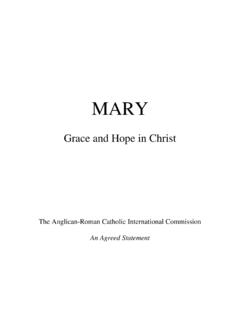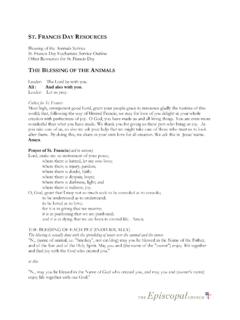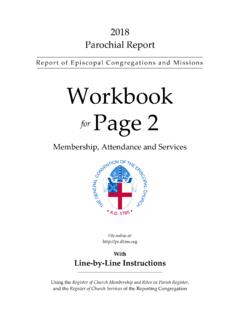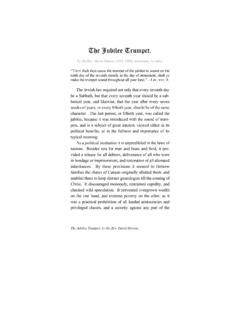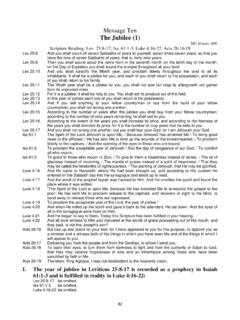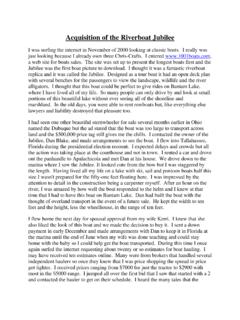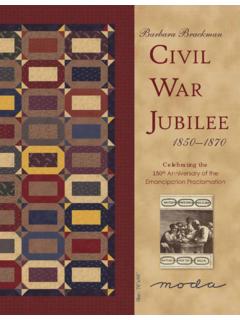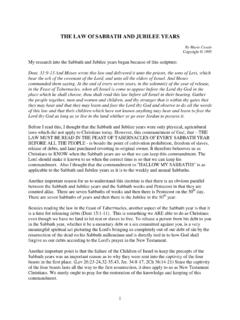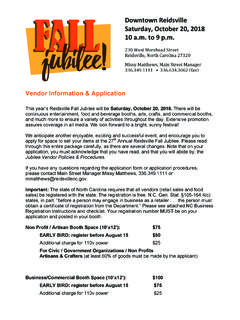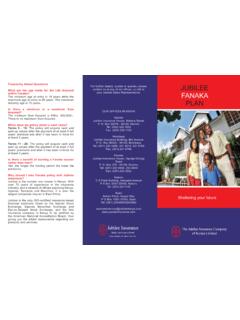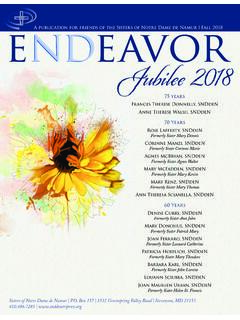Transcription of The Theology of Jubilee - The Episcopal Church
1 The Theology of Jubilee - 1 -The Theology of Jubilee presented by The Rev. Dr. Monrelle Williams At the very heart of the biblical understanding of God is the concept that God is a God who does: he is a God who intervenes in human affairs. God s intervention is usually for different purposes: it could be a salvific and liberative act on behalf of the oppressed, as in Exodus, or to bring judgment upon those who take advantage of others as we read in the Prophets. Along with this concept there is a collection of laws in the Old Testament which reflect this understanding of God: they speak of God s continual intervention in the community to ensure that the precepts of his will and purpose for the community are maintained. These laws make very real the intervention of God in every day relationships within the community.
2 In essence it can be claimed that God s intervention is never a haphazard affair; he never operates by chance. These laws reflect the will of God and ensure that every member of the community shared in the benefits produced within the community and that justice was distributed within the community. It is in this context that the laws governing the year of Jubilee are to be understood. The year of Jubilee is closely related to the Sabbatical year. The Sabbatical year was the seventh year of the cycle and the Jubilee year was the year following the Sabbatical year. Both the demands of the Sabbatical year and the Jubilee year support the understanding of the law as God s intervention into the affairs of the community. These demands emphasize the need to continually organize and re-organize the community so that the will of God is always reflected and obeyed.
3 In Leviticus chapter 25 we find what is perhaps the most comprehensive of these laws governing the Sabbatical and Jubilee years. The first seven verses contain the stipulations governing the Sabbatical year. The central stipulation requires that the land be left fallow during that year. In verses 8-55 we have the provisions for the Jubilee year: the liberation of those who are held in bondage like slaves and debtors, and the return of ancestral property to those who were forced to sell their property because of poverty. The Theology of Jubilee - 2 - These two demands are aimed at ensuring the type of systemic intervention into the dynamics of community to address the violations of the rights of the poor which occur in every socio-economic order devised by human beings.
4 These demands strengthen the Old Testament concept of a God who intervenes. These provisions for the Jubilee year are an excellent model than can be used as a pattern for life in community. It is claimed that in the context of the Old Testament they were the ideal and were never observed, and that the context out of which the book of Leviticus emerges supports this notion. But even so, this model has serious implications for the better organization of life within a community. The context of which Leviticus comes is one in which the Jewish community in Palestine is struggling to make ends meet. The community was made up of Jews who had returned from exile and who were determined to re-establish the community. In effect it was a community in crisis. It is out of this context that the writer of Leviticus 25 laid down the demands of the Jubilee year.
5 He saw the survival of the community as being linked to the demands of the Jubilee year. This is a significant observation because of the link between the Sabbatical year and the Jubilee year. The Sabbatical year called for the land to be left idle for a year, and yet here were people struggling for food and land and the writer asking for the demands of the Sabbatical year. But this is understandable if one recognizes the idea of the centrality of the land in the context of the Old Testament. Basic to the Theology of the Old Testament is the importance of having a country (a land) to call one s own, and the need to struggle to gain this land and maintain it. The book of Joshua tells us of various attempts and struggles to get the land.
6 What Leviticus 25 is doing is indicating some of the necessities for the land to be re-occupied and maintained. It is essentially dealing with the second struggle to occupy the land. He is therefore re-introducing the old understanding of the land as God s land which he has entrusted to Israel and hence the land must be treated with reverence; it must be rested every seven years. This is a demand which comes from the book of Exodus where it is said: For six years you shall sow your land and gather in its yield; but the seventh year you The Theology of Jubilee - 3 -shall let it rest and lie fallow, that the poor of your land may eat; and what they leave the wild beasts may eat. Leviticus 25: 6 says that the Sabbatical year ..shall provide food for you, for yourself and for your male and female slaves and for your hired servant and the sojourner who lives with you.
7 In effect it is saying that the food which grows naturally in the Sabbatical year is to be shared with the landless. Therefore there is here a link between God as the giver of the land and food for the poor and landless in the demands of the Sabbatical year. This was a model to which the community was called to aspire. This for him was an ought which placed the less than perfect conditions in his community in their true perspective. So what happens in the Jubilee year is the taking over of the old laws from ancient Israel and the application of them to the struggling Jewish community of his day. It is a reminder to the community of the need to extend liberation to those in bondage of any kind. Jubilee declared that the members of the community without freedom deserved the right to experience freedom at some point in their lives and that this right was seen as deriving directly from God.
8 The observance of Jubilee s demands to free the slaves was also an expression of the deep-rooted conviction that God intervenes in history to set at liberty the oppressed. It also suggests that human freedom was never to be left to chance nor just to the good will of the slave owners. Rather, it was supported by the written law which ensured that those who had lost their freedom, or never experienced it, were given a chance to live as free persons. The ought here is saying that no member of the community should exist without the experience of freedom. The second requirement of Jubilee is the return of ancestral property to those who were forced to sell. This is of course related to the importance of land ownership in the Old Testament.
9 The land was a manifestation of God s goodness and every Israelite had a right to ownership of a part of that land, and this takes us into the idea of yet another model. There are several places in the Old Testament where the violation of land rights of the vulnerable is condemned. The prophet Isaiah says: Woe to those who join house to house, who add field to field until there is no The prophet sees this as a violation of the The Theology of Jubilee - 4 -ancient right of each Israelite to the land. Micah also has injunctions against the violation of land rights of the vulnerable. (Micah 2: 1-2) Therefore the Old Testament speaks not only of the condition of landlessness as a violation of the rights of those who are landless, but also as an affront to God who owns the land.
10 Jubilee therefore becomes a response to the conditions of landlessness and seeks to reverse these conditions. It keeps ownership of land central to the experience of God s goodness. The prophetic Isaiah, at a much later period, picks up this notion of Jubilee proclaiming: The Spirit of the Lord is upon me, because the lord has anointed me to bring good tidings to the poor; he has sent me to bind up the broken hearted; to proclaim liberty to the captives, and the opening of the prison to those who are bound; to proclaim the day of the Lord s favor, and the day of vengeance of our God; to comfort all who mourn. (Is. 61: 1-2) This passage speaks to the total salvation of God s people: bodily, spiritually, individually and socially. It says that the messianic Jubilee has arrived.


